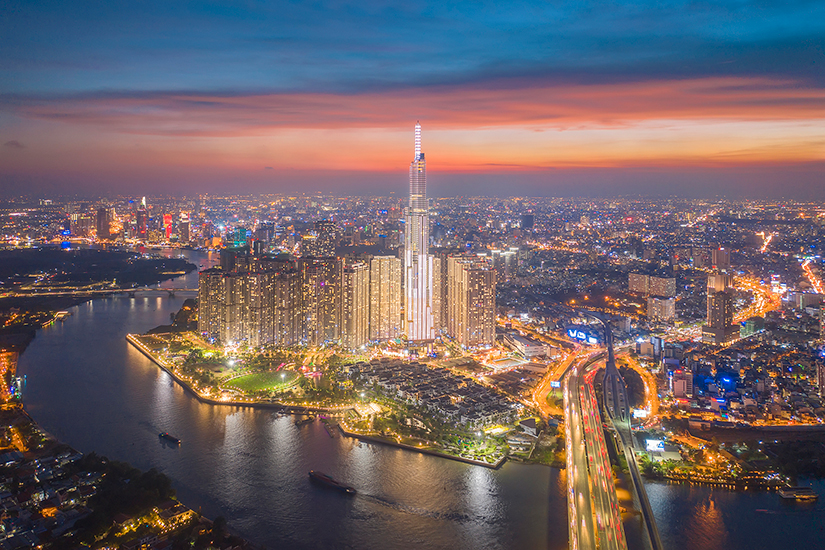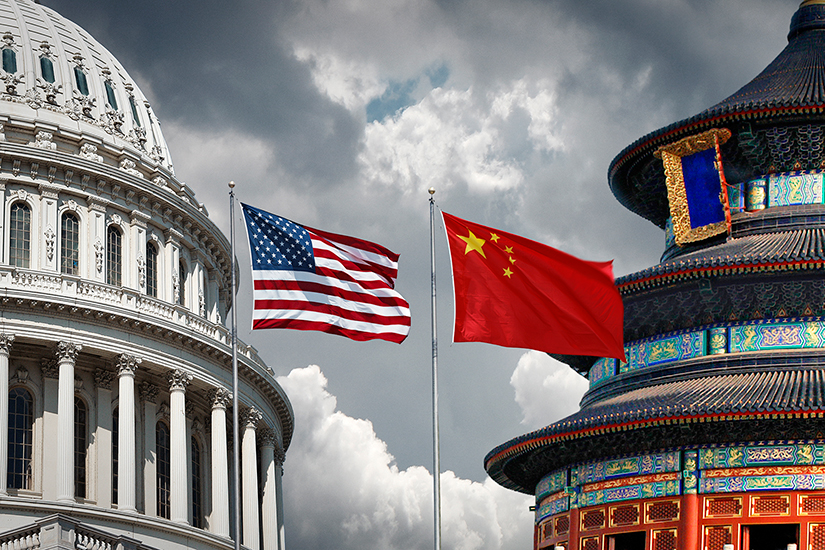In December 2023, President Xi Jinping of China made his third visit to Vietnam, the first in six years. The Vietnam side mobilized all of its political leadership to provide hospitality to President Xi. Firstly, Prime Minister Phạm Minh Chính went to meet Xi at Noi Bai Airport in Hanoi, then General Secretary of the Communist Party of Vietnam Nguyễn Phú Trọng entertained him constantly for two days, there were talks with President Võ Văn Thưởng and a courtesy call by Chairman of the National Assembly Vương Đình Huệ, and finally he was seen off at the airport by Chairman Huệ. On this visit, the hospitable nature of the reception given by the Vietnam side stood out. Vietnam has close relations with China in terms of politics and economics, while on the other hand it has tense relations in terms of security, in particular in the South China Sea. This short review explores the response of Vietnam at the time of President Xi’s visit to the country as a clue to assess the current position of Vietnam’s China policy.

Joint statement ― China-Vietnam relations to go to “new heights”[1]
The joint statement announced on the occasion of President Xi Jinping’s visit to Vietnam was titled “Continuing to deepen the comprehensive strategic cooperative partnership and building a Vietnam-China community with a shared future that carries strategic significance.” This means that at the milestone of 15 years since the conclusion of a comprehensive strategic partnership in 2008, Vietnam and China agreed to raise the relations of their two countries to the next level.[2]
Interestingly, in the Chinese version of the joint statement announced by China, “community with a shared future” was expressed as “community of destiny.” There is the word “vận mệnh” which means “destiny” in Vietnamese, but in the Vietnamese version that word was not used; rather the somewhat weak expression “shared future” was used.[3]The Vietnam side expressed reservations about the use of “destiny” and as a result of a compromise a term with a subtly different nuance was used in both the Vietnamese version and the Chinese version.[4] We can conclude that this result was produced by slight resistance by Vietnam, which does not consider sharing its destiny with China to be a good thing and wishes to maintain its autonomy.
On the occasion of the president’s visit to Vietnam this time, the two countries agreed to 36 cooperation documents. Among these, documents were signed on diplomatic and security cooperation, including an agreement concerning the deepening of cooperation between the two countries’ foreign ministries, an MoU of cooperation between the two countries’ defense ministries concerning joint patrol on their maritime border in the Tonkin Gulf, and in addition agreement documents were signed in relation to the “Belt and Road” initiative promoted by China and the “Two Corridors, One Belt” emphasized by China, which is attempting to advance infrastructure development cooperation between the two countries of China and Vietnam. We can infer from some of these cooperation documents that there has been progress in the kind of large-scale infrastructure development cooperation with China which Vietnam had avoided. For example, there is an agreement to build a bridge connecting the two countries across the Red River in the China-Vietnam border region of Lao Cai in northern Vietnam, and an MoU between the Ministry of Transport of Vietnam and the International Development Cooperation Agency of China to advance railway development across the Vietnam-China border.[5]
Regarding Taiwan, Vietnam declared its firm support for the “One China” policy, recognized that Taiwan is an inseparable part of the Chinese territory, resolutely opposed any separatist activity seeking “Taiwan Independence,” and clearly stated that it supported the principle of non-interference in internal affairs of other states.[6]
Posture of “deference”
A posture of “deference” oozes out from the response of Vietnam to Xi Jinping’s visit to the country. In the discussion by Alexander L. Vuving, professor at the Asia-Pacific Center for Security Studies (APCSS) in Hawaii and an expert in the diplomacy and security of Vietnam, this is an attitude China demands from Vietnam in exchange for China recognizing the autonomy of Vietnam to some extent, and is predicated on the unchangeable asymmetry in the bilateral relations of Vietnam and China.[7]
Against the background of great power competition with the United States, China is moving to win over Vietnam to Beijing’s side. For that reason, China is exclusively attacking the Philippines in the South China Sea; it is easing up on its attacks against Vietnam. Recently, there have been no notable examples of clashes between Vietnam and China in that sea area. Furthermore, investment by Chinese companies in Vietnam is growing rapidly, and the combined investment amount of China and Hong Kong ranked first in the amount of investment by country in 2023.[8]
Vietnam knows very well that China “pulling its punches” in the South China Sea is no more than an expedient approach for the time being which could turn aggressive at any time. Furthermore, investment by Chinese companies is essential for the economic growth of Vietnam, but excessive economic dependence on the “giant to the north” is not desirable from the perspective of strategic autonomy, and the activities of Chinese companies in Vietnam are causing labor and environmental problems. However, Vietnam believes that it is acceptable to contribute to the stabilization of relations for the time being by giving consideration to China and discerning its intentions. For that reason, Vietnam presented postures in line with China’s when Xi Jinping visited the country this time. For example, these include raising the comprehensive strategic partnership to the next level, infrastructure cooperation, and siding with China on the Taiwan issue.
Relations with the United States and Japan as a “check” ― promotion of “bamboo diplomacy”
Meanwhile, Vietnam is also actively engaging in diplomatic activities which maintain a balance with its relations with China. In recent years, Vietnam has been describing its own diplomatic style as “bamboo diplomacy.” This means aiming to enhance the national interest by adopting flexible foreign policies in accordance with the external environment and the domestic situation, and maintaining strategic autonomy rather than aligning with a specific country. Its basic posture is omnidirectional diplomacy.[9]

In advance of the visit of Xi Jinping to Vietnam, there was major progress in the relations between Vietnam and the United States. In September 2023, President Biden visited Vietnam and the two countries agreed to conclude a comprehensive strategic partnership. This was the tenth anniversary of the conclusion of a comprehensive partnership by the two countries in 2013, but it was an unusual measure in that the relationship was raised two levels, skipping over the level of strategic partnership. Furthermore, the two countries agreed to cooperate regarding the rebuilding of the supply chains for semiconductors and rare earth elements led by the United States, and it was decided that the United States will support semiconductor production in Vietnam and also that the United States will provide technical support for the development of rare earth elements in Vietnam. [10]
Vietnam has also continued to strengthen its relations with Japan. In November 2023, when President Thưởng made an official visit to Japan, the two countries agreed to conclude a comprehensive strategic partnership. On that occasion the two countries agreed to cooperation regarding rebuilding the supply chain, decarbonization, and Official Security Assistance (OSA).[11] For Vietnam, strengthening relations with Japan and the United States serves as a check on China.
When the U.S.-China confrontation intensified, Vietnam succeeded in simultaneously strengthening its relations with China on the one hand and with Japan and the United States on the other. This is an approach which became possible because both parties are aware of the strategic importance of Vietnam, and we can conclude that Vietnam gained an advantage from the U.S.-China confrontation. However, Vietnam does not take for granted that this favorable balance will continue for long. Economic pressure from China against the background of deepening economic dependence on that country and tensions in the South China Sea could occur at any time, while it cannot be predicted whether the policies of the United States with respect to Vietnam will progress well going forward. This is probably a strategy by Vietnam to advance the omnidirectional strengthening of relations as much as possible as a countermeasure for the time being aimed at buying time to build up its strength, in particular its economic strength, so that it can increase its strategic autonomy.
* The views in this paper are those of this author as an individual and are not the official views of the organization to which this author belongs.
(2024/03/13)
Notes
- 1 “Dấu mốc lịch sử, đưa quan hệ Việt Nam-Trung Quốc lên tầm cao mới,” Nhân dân, December 12, 2023.
(Historical Turning Point of Elevating Vietnam-China Relations to New Heights) - 2 “Tuyên bố chung về việc tiếp tục làm sâu sắc và nâng tầm quan hệ Đối tác hợp tác chiến lược toàn diện, xây dựng Cộng đồng chia sẻ tương lai Việt Nam-Trung Quốc có ý nghĩa chiến lược,” Nhân dân, December 13, 2023.
(Joint Statement concerning Continued Deepening of the Comprehensive Strategic Cooperative Partnership to Build a Vietnam-China Community with a Shared Future that Carries Strategic Significance) - 3 Ministry of Foreign Affairs of the People’s Republic of China, “Xi Jinping Published a Signed Article in a Vietnamese Newspaper,” December 12, 2023.
- 4 Francesco Guarascio, Khanh Vu and Phuong Nguyen, “Vietnam boosts China ties as ‘bamboo diplomacy’ follows US upgrade,” Reuters, December 12, 2023.
- 5 Báo Điện tử Chính phủ, “Việt Nam, Trung Quốc ký kết 36 văn bản thỏa thuận hợp tác,” December 12, 2023.
(Vietnam, China Sign 36 Cooperation Documents) - 6 The previously cited “Tuyên bố chung…”
- 7 Alexander L. Vuving, “Strategy and Evolution of Vietnam’s China Policy: A Changing Mixture of Pathways,” Asian Survey, 2006, p. 808.
- 8 Francesco Guarascio, “China’s Investments to Vietnam Boom as Xi Visits Hanoi, US Spending Down,” Reuters, December 8, 2023.
- 9 Tomotaka Shoji, “The ‘Bamboo Diplomacy’ of Vietnam ― Omnidirectional Diplomacy Learns from the Past,” International Information Network Analysis (IINA), Sasakawa Peace Foundation, August 31, 2023.
- 10 The White House, “Fact sheet: President Joseph R. Biden and General Secretary Nguyen Phu Trong Announce the U.S.-Vietnam Comprehensive Strategic Partnership,” September 10, 2023.
- 11 Ministry of Foreign Affairs of Japan, “Japan-Viet Nam Summit Meeting,” November 27, 2023.

